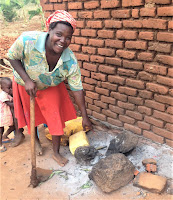by Tigaiza Arnold and Clare Killian, Interns, Ituba A Village
 |
| Arnold and Clare with Mr. Kintu Sam, his mother, and his wife |
She welcomed us into her humble home with a sweet and soft “Tusangaire!” (you are welcome) and we
sat down on the couches. The survey went smoothly, and as we conversed with
her, a middle aged man, who we later discovered was her son, was seated adjacent
to us. Throughout the duration of the survey, we thought the man was resting,
not paying attention to the activity happening nearby. Little did we know, not
only was he paying attention, but he would end up sparking a conversation emphasizing
malaria and its detrimental impact on the people he loves dearly. The impact of
this conversation would last much longer than the time they spent in this man’s
company.
When we completed the survey and thanked the woman, the man immediately cleared
his throat, sat up, and addressed us somewhat aggressively at first, asking our
names again. We answered quietly with a smile, unsure of what this man was
going to say. He then launched into a conversation, almost a lecture, about the
complex issue of malaria prevention. According to him, the long-standing
prevention methods focused on manufacturing and providing mosquito nets is
absolutely crucial and important, but is only a secondary and incomplete line
of prevention. Nets alone will not eliminate mosquitos and malaria. Nets alone will not prevent people from
getting bit by malaria-carrying mosquitos; the majority of life in Ugandan
culture is lived outside and sleeping is one of the only indoor activities.
Mosquitos are most prevalent from dusk until dawn, but almost no one
goes to bed before dusk and stays in bed until after dawn, especially in
village communities. “These people are
vulnerable when they are not sleeping, and that time period has not been
accounted for in malaria prevention efforts.” he said. He discussed how
malaria prevention must account for all the different lifestyles lived by people
affected by mosquitos every single day. Communities deserve individualistic and
culturally relative approaches to preventing this disease, something that
large, governmentally funded organizations and efforts tend to lack. His
passion for this issue was contagious and very evident. He expressed his
disbelief about how this debate has been going on for years in the academic and
political community, but almost nothing has been done in the field other than education
and mass distribution of mosquito nets.
 |
| Arnold and Clare with Mr. Kintu Sam |
We intently listened to him, agreeing wholeheartedly with his
statements. Unable to give answers to his important questions and opinions, we
struggled internally with this, feeling helpless in that moment. We assured him
that they would share his story, continue the conversation, and work within
their capacity to further the progress on malaria.
Weeks later, with our previous discussion with him still nagging in our
thoughts, we decided to go return to this man and talk to him more. When they arrived
at his home again, he was joyous to see them, welcoming them feverishly, and
eagerly sharing more information regarding his life and opinions. Once again we
enjoyed an engaging conversation with him. The time spent at this man’s home
with him and his family was wonderful, a new relationship blossoming between us.
People,
such as this man, can change the world. We were so fortunate to meet him, hold
an unforgettable conversation, and continue to foster our undeniable conviction
that every individual human life matters. Every life changed is significant and
people are not solely statistics, not only numbers in a global epidemic. People
are individuals and deserve to be treated as such. You never know what impact
you could have.














